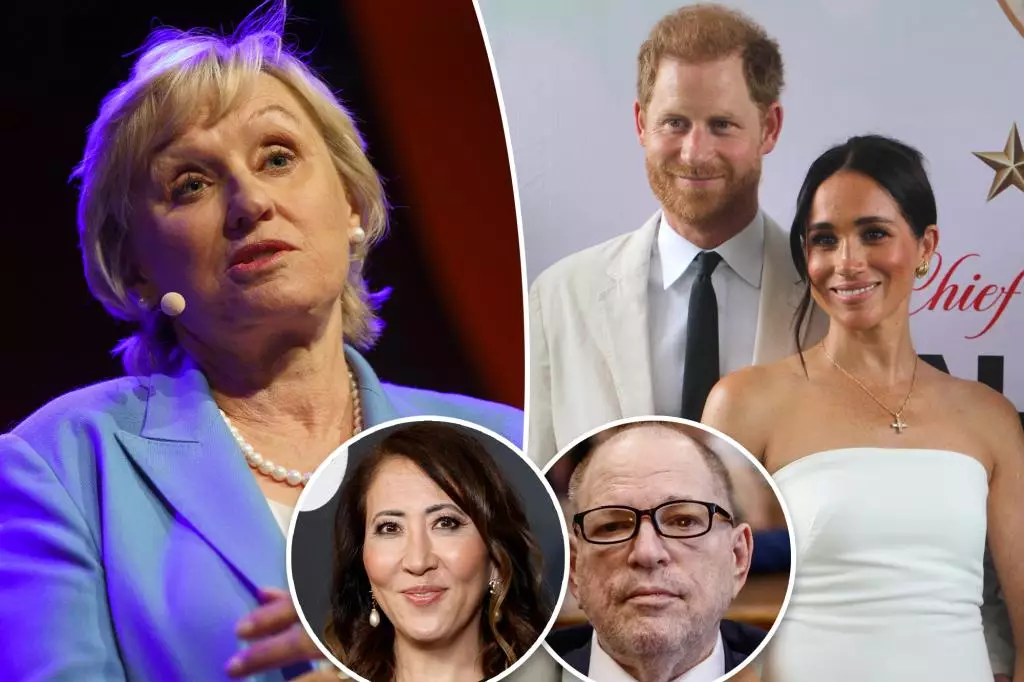In recent media engagements, Tina Brown, the former editor of notable publications like Vanity Fair and The New Yorker, has made waves with her unfiltered opinions about Meghan Markle and Prince Harry. Through her remarks, she provides a stark perspective that invites audiences to reconsider their views on the royal couple. Her criticisms are not merely personal; they hinge on broader themes of identity, ambition, and the inherent challenges of navigating the crossroads of celebrity and tradition.
Tina Brown does not mince her words when it comes to her opinion of Meghan Markle, asserting that “all of [her] ideas are total crap.” Her perspective suggests a fundamental disapproval of Markle’s strategies and tactics, suggesting that the Duchess may lack the requisite judgment to navigate the complexities of royal life effectively. Brown paints Markle as a figure who is “flawless about getting it all wrong,” which raises a critical question about the extent of Markle’s understanding of her new role as a public figure and, more importantly, a member of the royal family.
Brown extends her critique to Prince Harry as well, branding him a “naïve” individual. She argues that, despite his innate talents as a prince—skills honed through years within the royal institution—Harry has been led astray. Brown’s metaphor of Harry being a “lamb to the slaughter” aptly captures the vulnerability often attributed to him in his relationship with Markle. Here lies the crux of Brown’s argument: the dichotomy between Harry’s established identity and his loyalty to Markle’s vision places him at a perilous disadvantage.
The transition from being a royal to embracing celebrity life is fraught with complications, and Brown’s insights reveal the profound identity crisis faced by Harry and Meghan. She suggests that Harry, who was “extremely good and competent” in the military, has strayed too far from his rootedness in royal protocols and public service. This critique serves to underscore the essential qualities associated with royal duty, which Harry appears to have relinquished in favor of a more celebrity-driven path alongside his wife.
This exploration of identity also provokes the question of what it means to be a public figure in contemporary society. In their quest for independence, Harry and Meghan may have overlooked the nuances of their royal heritage, which could have offered them a more balanced approach to their ambitions as modern icons. This oversight is particularly pronounced when Brown notes that Harry “blindly followed” Meghan, hinting at a concerning power dynamic where personal ambition supersedes informed decision-making.
Brown’s assessment of Markle extends beyond personality to the decisions she has made since her marriage. Citing that she has made “every mistake in the book,” Brown is critical of Markle’s trajectory after stepping away from royal duties. This assertion implies that transitioning to a life of independence is not merely a matter of severing ties with the monarchy but also involves maintaining a coherent public persona that aligns with one’s past.
From embarking on various business ventures to public speaking engagements, Markle’s every move has come under scrutineering. The question arises: Can one genuinely forge a brand while grappling with a legacy as polarizing as that of a royal? Bloomberg proposes that this struggle to redefine one’s self amidst existing perceptions creates a challenging environment, particularly for someone like Markle, whose every misstep resonates with distinct ramifications.
Reflections on Leadership and Accountability
As the interview continues, Brown candidly recounts her past experiences with Harvey Weinstein, reflecting on the darker undercurrents within the media world. Her involvement with Weinstein and subsequent judgment of that partnership highlight the importance of leadership and accountability in establishing one’s brand. Just as Brown now evaluates her previous decisions, Markle and Harry must confront the consequences of theirs.
The notion of empowerment that Brown touches upon—especially in the context of women’s leadership—serves as a significant takeaway. Leading in an empowered manner requires not only ambition but also a discerning approach to decision-making. Whether it’s through strategic partnerships or personal relationships, understanding the landscape becomes crucial to achieving long-term success.
In sum, Tina Brown’s sharp critiques of Meghan Markle and Prince Harry unveil the many challenges that come with celebrity status, especially when entangled with royal heritage. As they navigate their identities amid public scrutiny, the insights from Brown offer a cautionary tale regarding the importance of informed choices. Moving forward, the Duke and Duchess of Sussex may need to redefine their strategies to forge a path that honors both their past and their aspirations, demonstrating that the journey to finding one’s identity is fraught with complexities—both expected and unforeseen.


Leave a Reply